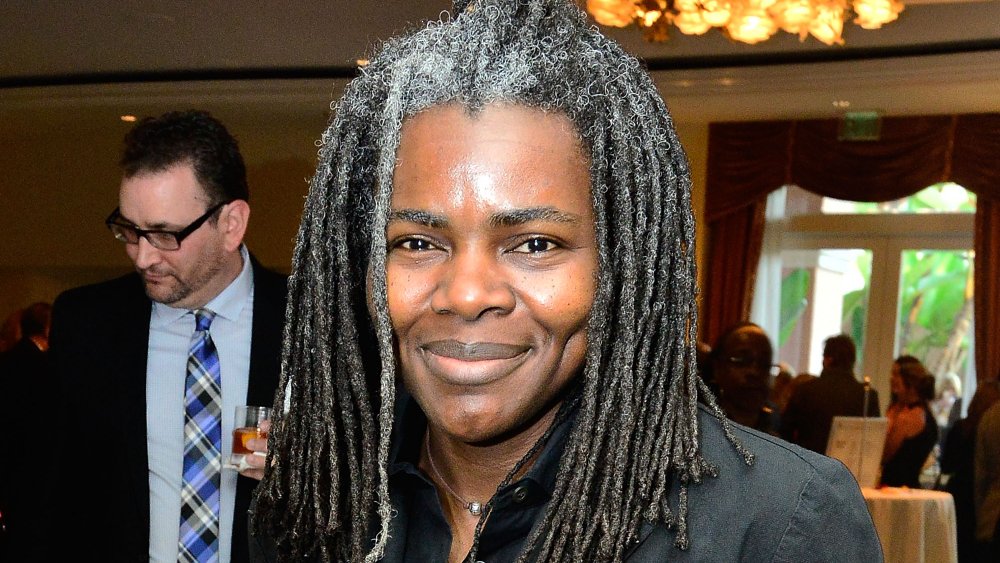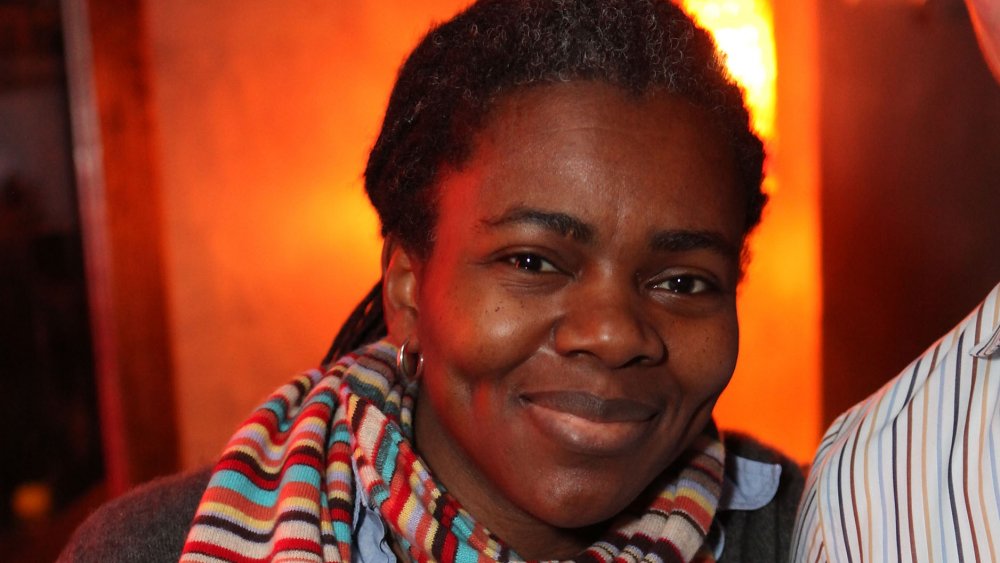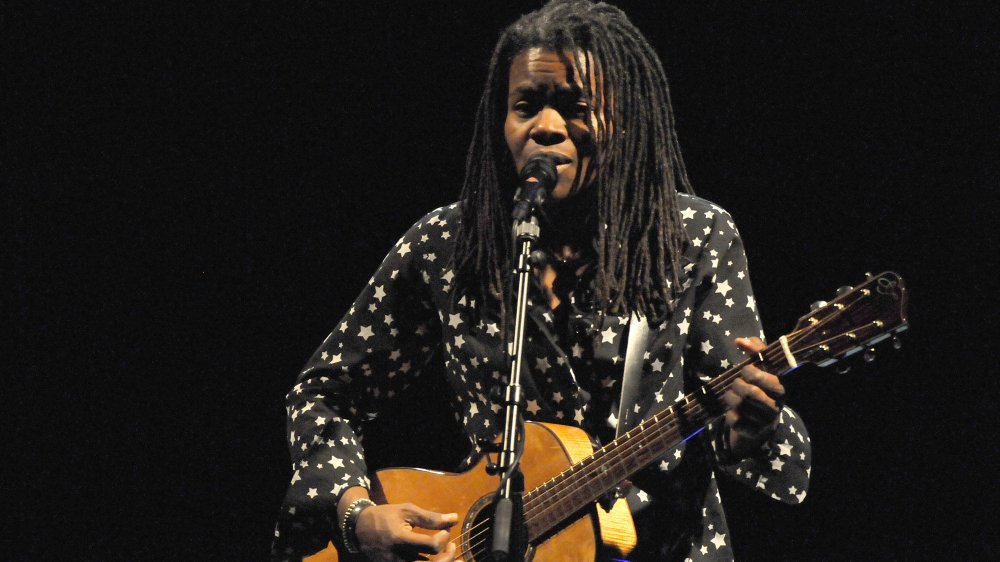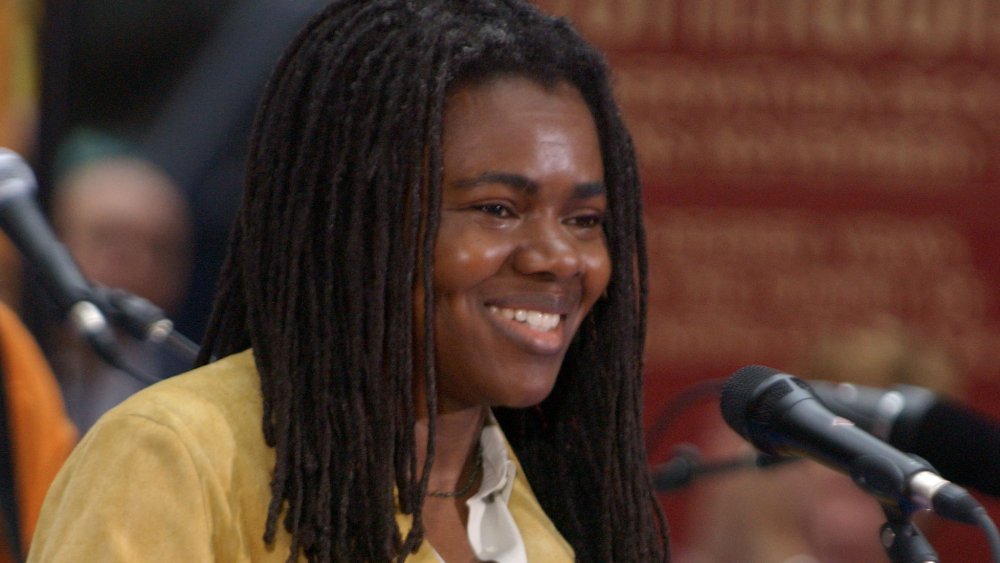Whatever Happened To Tracy Chapman?
Tracy Chapman is well regarded as a thoughtful, introspective (in a good way) singer-songwriter, producing tracks like "Fast Car" and "Give Me One Reason." She was born in March 30, 1964, in Ohio, but raised in Connecticut, says Biography. Smooth Radio relates that it was Chapman's mother who encouraged the music, giving Tracy that first instrument, a ukulele, when Tracy was three years old. Chapman began writing and performing original music while at Tufts University, enrolled in African studies and anthropology classes. Her self-titled first album was released in 1988, and the world became very aware of a woman who clearly values her privacy while still speaking a powerful truth about issues like poverty, racism, and violence against women. That year, Rolling Stone profiled Chapman, referring to "her carefully wrought tales of characters in contemporary America who seek meaning in the face of society's fragmentation." A life lived under the microscope (or caught in the spotlight — pick your metaphor) doesn't mean that she parades her private self in front of the media.
Chapman said 'yes' to Lena Dunham...
"Being in the public eye and under the glare of the spotlight was, and it still is, to some extent, uncomfortable for me, but there are some ways by which everything that has happened in my life has prepared me for this career," she told The Irish Times in 2018, adding, "But I am bit shy."
In terms of career, she fortuitously overcame that desire to keep to herself in one of those strokes of professional fate that usually happens in the movies, not real life. The Irish Times relates that in June, 1988, after her first album dropped the prior April (and had sold a most respectable one million copies), Chapman was booked to perform at a tribute concert in honor of Nelson Mandela's 70th birthday. The venue was Wembley Stadium in London, and she performed not one set, but two, because one of the other acts, Stevie Wonder (heard of him?) refused to go on because a piece of sound equipment was missing. To his credit, Wonder did indeed perform later in the event — but Chapman had already blown away an international crowd with her talent. In a very, very public setting.
... and No to Nicki Minaj
Capable of shining for all the world to see? Clearly. And equally clearly, not afraid to step back from that spotlight/microscope. According to Smooth Radio, her last studio album was recorded in 2008 (Our Bright Future, for a total of eight, spread over 20 years, says All Music); a "Greatest Hits" compilation was released in 2015. She's also notoriously protective of her work, refusing frequent (and potentially profitable) requests to use or sample her songs in other media. Vanity Fair reports that fans were shocked when Chapman gave permission to Lena Dunham to use "Fast Car" in the series finale of Girls back in 2017.
The show's music director, Manish Raval, had reached out to Chapman's people — "I know it's always no," he recalled saying. But gave it the good ol' college try anyway. Maybe Dunham could speak personally with Chapman, make her case? Because this song is the perfect way to end the series? Please? Dunham and Chapman came to an agreement after all of about 10 minutes on the phone. Like we said — shocked.
She performs benefits to support various causes
Because it almost never goes like that. Case in point: In 2018 Chapman brought suit for copyright infringement against Nicki Minaj — the rapper had recorded a collaboration, titled "Sorry," with Nas, that had "interpolated" Chapman's 1988 track "Baby Can I Hold You" without Chapman's permission. As Rolling Stone tells us, the Minaj track was never released, but it was played on Hot 97 as well as other outlets, and so audio exists online. It wasn't as though Minaj didn't ask for Chapman's permission to use "Baby Can I Hold You" — as have many others over the years, for one composition or another. She asked, and Chapman declined. But wait, said Minaj's team (or words to that effect). Nicki is "inspired" by Chapman's art. How about a personal discussion, two artists talking together as artists? Trying "desperately" to pull that off, said Minaj in a tweet. No go.
Chapman has long been a quiet activist as well, playing benefits for various causes dear to her heart. And refuses to discuss her private life, or use social media. "I have this personality that is a bit on the reserved side, and which had never really sought out the limelight," she told The Irish Times. "That has made me perhaps not the ideal person for this job."
Still, Chapman's absence from the public eye tells us something — she's busy living a normal life.



